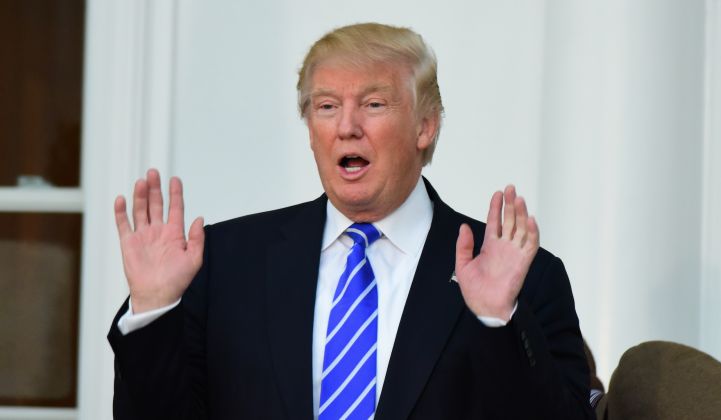President Trump has two weeks left to decide whether to impose trade remedies on imported solar equipment. If he follows the guidance of his advisers, big changes could be coming to the solar industry.
E&E News reported that Trump is expected to receive a formal recommendation to move forward with trade penalties as early as Friday, according to industry sources.
Insiders said the president discussed potential tariffs on Tuesday with U.S. Trade Representative Robert Lighthizer, Commerce Secretary Wilbur Ross and National Economic Council Director Gary Cohn.
Troubled solar manufacturers Suniva and SolarWorld launched the trade case last year under an obscure section of the Trade Act of 1974 that allows the president to implement tariffs, minimum prices or quotas on products from anywhere in the world. Last fall, the U.S. International Trade Commission (U.S. ITC) unanimously agreed that imported solar equipment had caused "serious injury" to the manufacturers and proposed three potential remedies.
President Trump can choose to adopt some or none of the proposals put forward by commissioners. At the end of the day, the severity of the trade measures will be entirely up to him.
Based on developments over the last 48 hours, congressional staff and lobbyists working on the case “are increasingly optimistic that it’s not going to be as restrictive as they thought it would be,” an industry source told GTM.
“I’ve heard in the last couple days there’s a good chance the administration isn’t going to embrace the more restrictive recommendations that the ITC made,” said the source.
Lighthizer, a Trump appointee who heads the U.S. Trade Representative, is tasked with advising the president on how to handle the remedies recommended by the U.S. ITC. As part of a final lobbying push, the Solar Energy Industries Association (SEIA) and representatives from nine solar companies met with Lighthizer last week to make their case against import tariffs.
“He was very engaged in the conversation and knowledgeable about the case, but appropriately didn’t give it away where he was leaning,” said Abigail Ross Hopper, SEIA's president and CEO.
“It’s a tough situation to be in -- you don’t even know what they’re thinking,” said Bill Vietas, the president of Cincinnati-based mounting manufacturer RBI Solar. “You just hope they understand jobs are really on the line here.”
Vietas was part of another SEIA group that met on Tuesday with Commerce Secretary Wilbur Ross, who has called China “protectionist” and characterized NAFTA as “obsolete.”
SEIA estimates that the trade remedies proposed by Suniva and SolarWorld would destroy between 48,000 and 63,000 American solar jobs next year, and between 60,000 and 84,000 jobs by 2020. Since the trade case began, the group has organized more than 100 meetings with lawmakers, members of the Trump administration and other key players, said spokesperson Dan Whitten.
Other solar groups have stepped up to support the cause using social and advertising campaigns. A coalition of manufacturers, U.S. Made Solar, has been running TV advertisements during shows that President Trump watches regularly, such as Fox & Friends.
Ten U.S. solar module manufacturers have come out against the tariffs, including Tesla. Despite teaming up with Panasonic to start manufacturing solar roofs in New York, Tesla said it still relies on imports to meet demand.
Proponents of solar tariffs have been pushing their side as well. On Wednesday, the bipartisan group Coalition for a Prosperous America sent a letter urging the president to impose a “global tariff” on imports.
“An affirmative determination is necessary to prevent the complete collapse of a critical manufacturing industry...and the loss of thousands of good paying U.S. manufacturing jobs,” wrote coalition CEO Michael Stumo.
In an interview with GTM, Stumo said the group, which is largely supported by companies in the metal and agricultural industries, is also urging the president to impose tariffs on steel imports. Secretary Ross is expected to give recommendations to Trump on a Section 232 steel trade case by Monday.
“We’re not sure why they’re wading into the solar fight,” said Whitten. “To think that you can impose tariffs on panels around the world and still meet demand for solar panels -- it doesn’t square with reality.”
The coalition’s board of directors is led by Dan DiMicco, the former CEO of Nucor Steel and head trade adviser to Trump during his presidential campaign. DiMicco is a vocal proponent of tariffs for the steel industry and has written op-eds for The Hill and Breitbart News that blast China for driving down steel prices.
The president considered DiMicco for the U.S. trade representative post, which ultimately went to Lighthizer. Trump spent hours with DiMicco at his apartment in December 2016.
In an interview with McClatchy, DiMicco described Lighthizer as “a longtime partner in the trade battles and friend.”
There is clear support for trade restrictions within President Trump’s circle of advisers and allies, but not all of his backers are sold on the idea of solar tariffs. Media ally Sean Hannity and a Breitbart contributor have both argued that new tariffs would benefit foreign financiers -- to the surprise of many solar advocates on the left.
Conservative, free-trade advocates at the Heritage Foundation and the American Legislative Exchange Council have also come out against trade remedies.
“To be honest, I don’t know who has the president’s ear on this case,” said Clark Packard, trade lawyer and policy analyst for the R Street Institute, a free-market think tank.
“Obviously, there’s only one person who knows the answer to this, and trying to get inside his head is bananas.”
President Trump has until January 26 to decide whether he'll impose new trade duties.




